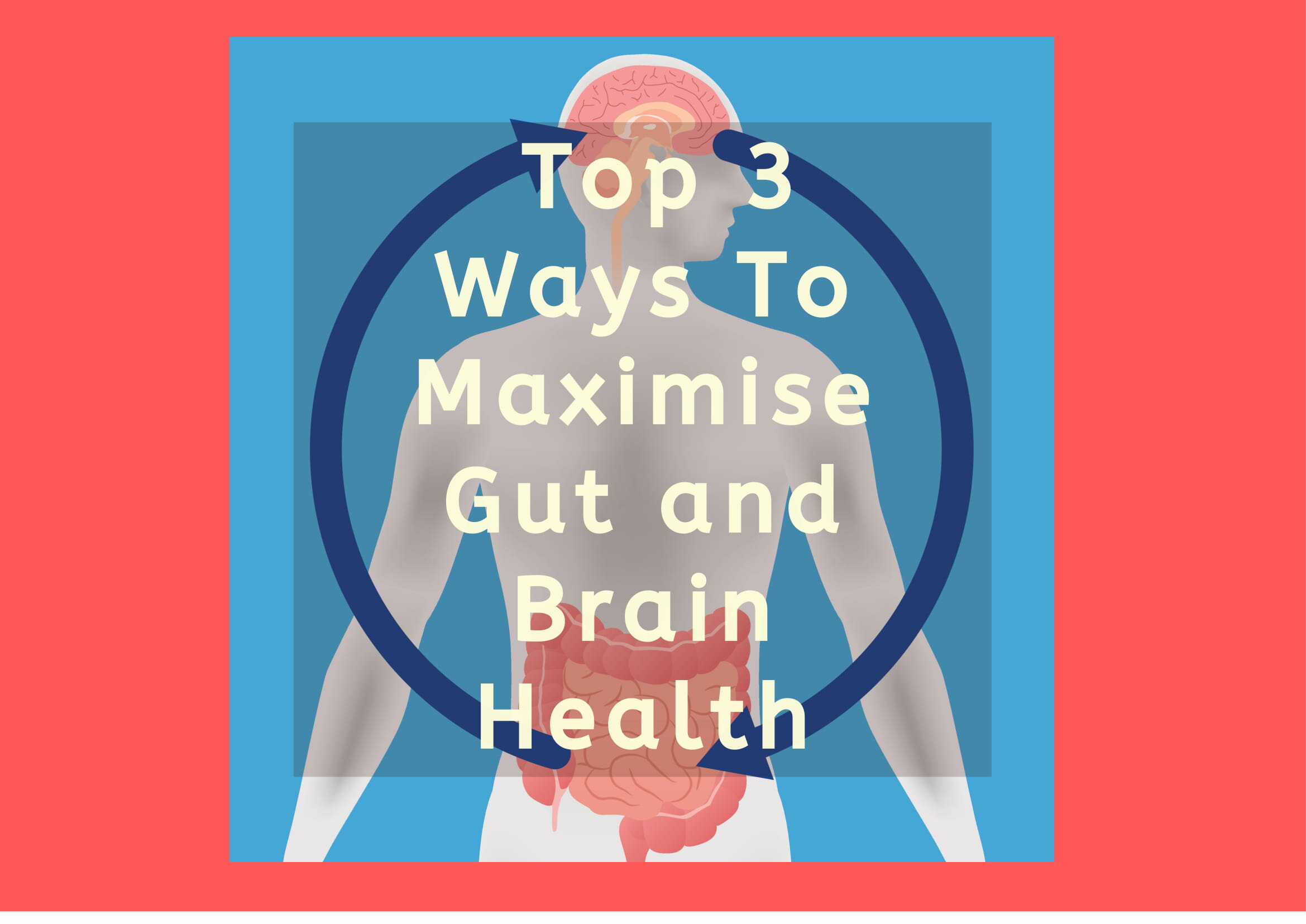Top 3 Ways To Maximise Gut and Brain Health
There is much discussion about gut and brain health today and many books and articles written about the subject.
Taking a deep dive into this topic is not on everyone’s agenda, and truth be told, it is a very complex subject.
Also, there’s a lot we don't yet know and will likely remain in the dark about for a long time to come.
So let’s simplify the topic so we can action what we know, without needing to know it all.
And if you really don't want to know even a little of the detail, and just want to action what evidence-based research suggests, skip ahead to the ‘So, what to do?’ section.
A few facts before we dive into details
We have 100 trillion bacteria in our gut (which is more than the 60 trillion cells we possess).
We are shy of 21,000 genes, but the microbes in our body contain 4.4 million genes.
There are (or should be) about 4,000 different species of bacteria in our gut.
The bacteria in our gut weigh anywhere from 1 – 2.3 kg’s (3 – 5lbs) which is greater than or similar to the weight of the brain at 1.3 – 1.4kg (2.9 – 3.1lbs).
The immune system in the gut is called GALT (Gut Associated Lymphatic Tissue) and represents 70- 80% of our body’s total immune system because this is where the greatest threat to our health (maybe even survival) comes from.
How the gut and brain are linked
Gut bacteria influence three primary areas that impact brain function:
How food is digested and therefore how available it is for absorption and utilisation.
Which, and how effectively vitamins and neurotransmitters are synthesized, for example, 80%+ of serotonin (peripheral) is synthesised in the gut.
How permeable the gut/blood stream interface is which impacts gut health overall, including digestion, absorption, inflammation and immunity.
Communication between the gut and the brain is controlled by the immune system, the endocrine (hormone) system and the central nervous system (CNS), all of which are under the influence of gut bacteria.
The brain and gut have a bidirectional relationship. Think of butterflies in your stomach when your brain perceives a threat, or even excitement.
And stress in the gut can be directed up to the brain via the vagus nerve (VN), called thus from the Latin term ‘vagus’ meaning wandering.
The VN is the longest of 12 cranial nerves and is the primary channel of information between the 100s of millions of nerve cells in the enteric nervous system (ENS), the nervous system that resides in the digestive tract, and the CNS.
The VN is also involved with controlling heart rate and digestion and plays a major role in managing the inflammatory response system in the body.
However, 80% of VN fibers carry information from the organs in the body to the brain – not the opposite way.
The role of inflammation
A lack of specific nutrients, or an inability to absorb them optimally, will lead to inflammation generally, and specifically, a lack of neurotransmitters with which to manage mood.
This is one of the mechanisms by which depression is likely influenced by gut bacteria. The presence of high levels of inflammatory markers, which signify risk of depression, supports this hypothesis.
Furthermore, when the body becomes inflamed, so does the blood brain barrier (BBB), which is the gatekeeper against harmful pathogens entering the brain.
When toxic compounds get a foothold in the brain they cause damage to this sensitive and sophisticated organ.
An increasingly robust body of research is highlighting that when the brain becomes inflamed it becomes susceptible to mental health challenges, including anxiety and depression. Unfortunately, an inflamed brain is also more susceptible to cognitive decline.
Gut health and weight
The ratio of a variety of gut bacteria, including that of those that are excellent at extracting every last calorie from our food, and those that are less so, can become out of balance.
When this happens, either unexplained weight gain or loss could be the result.
Unfortunately, for many people, the ratio seems to favor those bacteria that are excellent at extracting calories versus ignoring them, leading to weight gain.
Improving gut health will naturally improve the ratio of the bacteria favoring less scrupulous extraction, resulting in positive results.
3 Forces working against a healthy gut
Research suggests we can improve our digestive health via improving gut bacteria in as little as 4 days. Pay attention to the following aspects that undermine gut health:
Lack of gut-supportive nutrients.
Exposure to substances that change the bacteria ratio (colonies) eg. Anti-biotics, gluten, sugar, factory foods which include additives, flavorings and preservatives, over the counter (OTC) medication, chlorine, pesticides, fungicides, rodent-cides.
Stress – psychological and oxidative stress, including from what is generated from the above two challenges.
1. Gut supporting nutrients
The bacteria in our gut love fibre, so this is what we need to eat more of. When we eat food that is full of fibre, we naturally crowd out the processed foods that prohibit the growth and proliferation of the bacteria that support optimal gut health.
Many people use probiotics in capsule form. However it is more sustainable to supply the food for good bacteria to proliferate and change ones diet to support such.
In addition, no probiotic can supply the full spectrum of bacteria we requite for optimal gut health.
So, use probiotics as a starting point for improved gut health, knowing they are unable to provide the full spectrum of good bacteria.
A more natural way to provide the good bacteria with what they need is to eat fermented foods such as kimchi, sauerkraut and miso, which are rich in probiotics.
Eating prebiotic foods goes a step further by providing food for our good bacteria, and support their growth sustainably:
These are some of my favorite common foods that provide robust prebiotic benefits:
Artichokes
Raspberries
Chickpeas
Asparagus
Garlic, leeks and onions
Red kidney beans
Savoy cabbage
In the process by which the good bacteria metabolize their sources of fuel from our fibre-filled diet they also liberate specific nutrients such as vitamin A, C and K and some B vitamins.
In turn, these nutrients are used to support both mental and physical health.
2. Substances that impact gut health
Antibiotics are used for human health and in agriculture, so we can ingest them either way. Antibiotics impact the diversity and composition of our gut bacteria which can obliterate some and allow others to flourish.
Differences in gut bacteria composition is noted in lean versus heavier animals and people, leading researchers to suggest that gut bacteria is directly linked to gut bacteria composition and ratio.
Pesticides and chlorine are bactericidal and therefore toxic to gut bacteria and glyphosate inhibits the synthesis of enzymes produced by gut bacteria, which detoxify foreign chemical compounds.
The inhibition of this enzyme leads to increased risk of intestinal wall permeability.
3. Stress
When the brain is triggered into believing that our survival is at stake, correctly or not, it triggers the release of hormones that tell the body to be prepared to run, hide or fight.
To a lesser or greater extent, cortisol is released, which leads to the release of glucose with which to address the stressor. The body goes on the defense and an immune response is triggered.
In addition, chronic cortisol release causes the tight junctions between intestinal cells to become compromised so they can’t do their job effectively anymore.
This allows the pathogenic substances it was designed to prevent from entering the blood stream, to enter.
Furthermore, stress impacts sleep because cortisol is intimately linked to circadian rhythm and gut bacteria. And sleep challenges impact gut bacteria in ways not yet fully understood.
Research that examined the gut bacteria of jet-lagged passengers found a correlation between compromised gut bacteria and sleep deprivation.
So, what to do?
As per the three sections above, increasing the intake of fibre-filled food, avoiding toxic compounds that impact gut bacteria and reducing stress are the three simplest and best steps to take with which to improve gut heath:
Step 1, focus on adding delicious fibre filled foods to your diet versus removing processed ones. You won’t feel deprived and the processed foods will naturally become less appealing.
And unprocessed foods force one to chew more, which supports improved digestion, and they fill one up more than processed foods do, so weight loss is a happy by-product of following this step.
Step 2, aim to purchase organic or pesticide free fresh produce as much as possible and work on ways to reduce the use of OTC medication.
Step 3, find ways to lessen your stress burden, which will increase the quality of your sleep directly, and also the health of your gut indirectly via a reduction in stress hormone production.
In conclusion, the intricate and intimate link between the gut and the brain is fascinating and there’s still a vast amount we don't know about this relationship. However, we do know that it doesn't take very long for the gut to respond to these strategies. And the benefits are plentiful.
Click these links for the three-part article about digestion, absorption, and elimination.
Please check the ‘10 Step Gut (and Brain) Reboot’ Online Course if you want a focused, simple 10 step program to improve gut (and brain) health with ease.
References
Aly J, Engmann O. The Way to a Human's Brain Goes Through Their Stomach: Dietary Factors in Major Depressive Disorder. Front Neurosci. 2020 Dec 7;14:582853.
Ahima, R. S. (2011). Digging deeper into obesity. Journal of Clinical Investigation, 121(6), 2076-2079.
Bell, V., Ferrao, J., Pimentel, L., Pintado, M., & Fernandes, T. (2018). One Health, Fermented Foods, and Gut Microbiota. Foods, 7(12).
Breit, S., Kupferberg, A., Rogler, G., & Hasler, G. (2018). Vagus Nerve as Modulator of the Brain-Gut Axis in Psychiatric and Inflammatory Disorders. Frontiers in psychiatry, 9, 44-44.
David, L. A., Maurice, C. F., Carmody, R. N., Gootenberg, D. B., Button, J. E., Wolfe, B. E., . . . Turnbaugh, P. J. (2014). Diet rapidly and reproducibly alters the human gut microbiome. Nature, 505(7484), 559-563.
Evrensel A, Ünsalver BÖ, Ceylan ME. Neuroinflammation, Gut-Brain Axis and Depression. Psychiatry Investig. 2020 Jan;17(1):2-8.
Konturek, P. C., Brzozowski, T., & Konturek, S. J. (2011). Stress and the gut: pathophysiology, clinical consequences, diagnostic approach and treatment options. Journal of Physiology and Pharmacology, 62(6), 591-599.
Matenchuk, B. A., Mandhane, P. J., & Kozyrskyj, A. L. (2020). Sleep, circadian rhythm, and gut microbiota. Sleep Medicine Reviews, 53, 101340.
O’Mahony, S. M., Clarke, G., Borre, Y. E., Dinan, T. G., & Cryan, J. F. (2015). Serotonin, tryptophan metabolism and the brain-gut-microbiome axis. Behavioural Brain Research, 277, 32-48.
Osimo EF, Pillinger T, Rodriguez IM, Khandaker GM, Pariante CM, Howes OD. Inflammatory markers in depression: A meta-analysis of mean differences and variability in 5,166 patients and 5,083 controls. Brain Behav Immun. 2020 Jul;87:901-909.
Perlmutter, D and Loberg, K. (2015). Brain Maker: The Power of Gut Microbes to Heal and Protect Your Brain For Life. Little, Brown and Company Publishers: USA.
Schmidt, C. (2015). Mental health: thinking from the gut. Nature, 518(7540), S12-15.
Smith, R. P., Easson, C., Lyle, S. M., Kapoor, R., Donnelly, C. P., Davidson, E. J., . . . Tartar, J. L. (2019). Gut microbiome diversity is associated with sleep physiology in humans. PloS One, 14(10), e0222394.
Turnbaugh, P. J., Ley, R. E., Mahowald, M. A., Magrini, V., Mardis, E. R., & Gordon, J. I. (2006). An obesity-associated gut microbiome with increased capacity for energy harvest. Nature, 444(7122), 1027-1031.
Valles-Colomer, M., Falony, G., Darzi, Y., Tigchelaar, E. F., Wang, J., Tito, R. Y., . . . Raes, J. (2019). The neuroactive potential of the human gut microbiota in quality of life and depression. Nat Microbiol, 4(4), 623-632.


